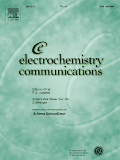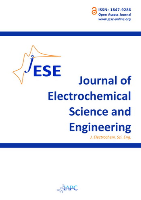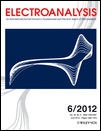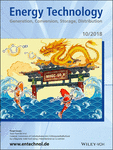
Journal of Electrochemical Science and Technology
Scope & Guideline
Pioneering Discoveries in Electrochemistry
Introduction
Aims and Scopes
- Electrochemical Energy Storage:
This area includes research on lithium-ion batteries, supercapacitors, and solid-state batteries, focusing on improving performance, efficiency, and longevity through novel materials and innovative designs. - Electrocatalysis:
Papers in this scope explore the development of catalysts for various electrochemical reactions, including hydrogen evolution, oxygen reduction, and electrooxidation processes, aimed at enhancing energy conversion efficiency. - Electrochemical Sensors:
Research on the design and application of electrochemical sensors for detecting various analytes, including glucose, heavy metals, and environmental pollutants, is a significant focus area, emphasizing sensitivity and selectivity. - Electrochemical Processes in Environmental Applications:
This includes studies on wastewater treatment, pollution remediation, and resource recovery through electrochemical methods, highlighting the role of electrochemistry in sustainable practices. - Materials for Electrochemical Applications:
Research on new materials—such as nanostructured materials, composites, and polymers—that enhance the performance of electrochemical devices is a core focus, driving innovation in the field. - Theoretical and Computational Electrochemistry:
Papers that leverage computational methods to model electrochemical systems and predict performance outcomes are integral to advancing understanding and guiding experimental work.
Trending and Emerging
- Advanced Battery Technologies:
There is a notable increase in research related to next-generation batteries, such as lithium-sulfur and solid-state batteries, driven by the demand for higher energy densities and safety in energy storage. - Sustainable Electrochemical Processes:
Emerging themes include the use of electrochemical methods for sustainable practices such as carbon capture, green hydrogen production, and waste valorization, aligning with global sustainability goals. - Integration of Nanotechnology in Electrochemistry:
The application of nanomaterials and nanostructures to enhance electrochemical performance is increasingly popular, offering improved properties for energy storage and conversion devices. - Hybrid and Composite Electrode Materials:
Research on hybrid materials that combine different types of materials for optimized electrochemical performance is on the rise, reflecting a trend towards multifunctional and efficient electrode designs. - Electrochemical Sensing Innovations:
The development of new sensing technologies utilizing electrochemical methods is rapidly expanding, particularly in the fields of healthcare and environmental monitoring, driven by the need for rapid and accurate diagnostics.
Declining or Waning
- Traditional Corrosion Studies:
Research specifically centered on traditional corrosion mechanisms and their mitigation strategies has been less prominent in recent publications, possibly overshadowed by more innovative electrochemical applications. - Basic Electrochemical Theory and Fundamentals:
Papers focused solely on theoretical aspects without practical applications have seen a decline, as the trend shifts towards applied research that directly addresses real-world problems. - Low-Temperature Fuel Cells:
Research on low-temperature fuel cell technologies, while still relevant, has decreased in favor of solid oxide fuel cells and other more efficient systems, reflecting a shift towards higher efficiency energy solutions.
Similar Journals

ELECTROCHEMISTRY COMMUNICATIONS
Empowering Researchers with Cutting-Edge Electrochemical KnowledgeELECTROCHEMISTRY COMMUNICATIONS, published by ELSEVIER SCIENCE INC, is a leading journal in the field of electrochemistry, holding a prestigious position in the Q1 quartile since 2023. With an impact factor reflecting its esteemed reputation, the journal ranks #15 out of 60 in the Scopus Chemistry category for Electrochemistry, placing it in the 75th percentile. Since adopting an Open Access model in 2019, it has garnered widespread visibility and accessibility, enabling researchers and professionals to share groundbreaking findings and foster innovation. Covering a wide range of topics from fundamental electrochemical research to practical applications, ELECTROCHEMISTRY COMMUNICATIONS serves as a critical platform for disseminating knowledge and advancing the field. The journal's commitment to quality and relevance positions it as a vital resource for academics and practitioners striving to stay at the forefront of electrochemical science.

Analytical & Bioanalytical Electrochemistry
Bridging Disciplines Through Electrochemical InnovationAnalytical & Bioanalytical Electrochemistry is a pivotal journal dedicated to the advancement of research and innovation in the fields of analytical chemistry and electrochemistry. Published by the University of Tehran, Faculty of Chemistry, Center of Excellence in Electrochemistry, this journal has been contributing to the scientific community since its inception in 2009 and continues to be a critical platform through 2024. With an ISSN of 2008-4226, it focuses on a variety of topics including electrochemical sensors, bioanalytical techniques, and innovative methodologies in electrochemical analysis. Although it currently holds a Q4 quartile ranking in both analytical chemistry and electrochemistry categories, its unique insights and research findings are essential for advancing knowledge and fostering interdisciplinary collaboration within the scientific community. Researchers, professionals, and students engaged in these dynamic fields will find valuable resources and contribute to the ongoing discourse by publishing their work in this journal. We invite you to explore and engage with the diverse content that Analytical & Bioanalytical Electrochemistry offers to enhance your research and professional development.

Journal of Electrochemical Science and Engineering
Empowering Global Collaboration in Electrochemical Science.The Journal of Electrochemical Science and Engineering, published by the International Association of Physical Chemists (IAPC), serves as a vital resource for researchers and professionals in the fields of electrochemistry, materials chemistry, and chemical engineering. With an Open Access model since 2011, this journal ensures that groundbreaking research is freely accessible to a global audience, promoting collaboration and knowledge sharing. Situated in Croatia, it showcases cutting-edge developments while focusing on applied aspects related to electrochemical technologies. Notably, the journal holds a commendable Scopus ranking, placing it within the Q3 quartile for multiple categories, including Chemical Engineering (miscellaneous) and Electrochemistry. By fostering innovative research and comprehensive reviews, the Journal of Electrochemical Science and Engineering plays a crucial role in advancing the understanding and application of electrochemical processes, making it an indispensable platform for academics and practitioners alike.

ELECTROANALYSIS
Advancing the Frontiers of ElectrochemistryELECTROANALYSIS is a premier journal published by WILEY-V C H VERLAG GMBH that serves the dynamic field of analytical and electrochemistry. Established in 1989, this scholarly publication has successfully converged its focus to cover a wide array of topics including novel electrochemical methods, sensor technology, and environmental analysis, reflecting the latest advancements and trends in the field. With an impressive 2023 impact factor that places it in the Q2 quartile of Analytical Chemistry and Q3 quartile in Electrochemistry, the journal is recognized for its high-quality research and contributions. Its Scopus rankings further reinforce its credibility, standing at #46/156 in Analytical Chemistry and #26/60 in Electrochemistry. Although currently not offering Open Access, the journal remains a significant resource for researchers, professionals, and students keen to stay at the forefront of electroanalytical techniques. With a global readership, ELECTROANALYSIS continues to drive knowledge and innovation within the scientific community.

Energy Materials
Transforming Energy Landscapes with Innovative Materials.Energy Materials is a pioneering journal published by OAE PUBLISHING INC, dedicated to the dynamic field of energy materials science and engineering. With a focus on advancing knowledge related to materials used in various energy applications such as batteries, fuel cells, and solar cells, this open-access journal aims to disseminate cutting-edge research and innovative methodologies to a global audience. By offering a platform for original research, reviews, and case studies, Energy Materials plays a crucial role in bridging the gap between materials science and energy technology, facilitating the development of sustainable energy solutions. Researchers, professionals, and students alike will find invaluable insights in its pages, fostering advancements in this essential sector. To explore the latest developments in energy materials, visit Energy Materials at OAE PUBLISHING INC.

Energy Technology
Exploring Breakthroughs in Energy TechnologyEnergy Technology, published by Wiley-VCH Verlag GmbH, is a prominent peer-reviewed journal dedicated to advancing the field of energy research and technology. With an ISSN of 2194-4288 and an E-ISSN of 2194-4296, this journal has made a significant impact in the energy sector, holding a Q2 category ranking in the Energy (miscellaneous) category for 2023, and proudly positioned in the 77th percentile within the Scopus ranking for General Energy. Since its inception in 2013, Energy Technology has consistently published cutting-edge research, innovations, and reviews that cater to a wide array of topics including renewable energy, sustainable technologies, and energy efficiency. The journal does not offer open access, yet it remains a key resource for researchers, professionals, and students who are committed to exploring the dynamic field of energy. The journal's efforts to disseminate rigorous scholarship make it an invaluable asset for anyone looking to contribute to or understand the future of energy-related technologies until 2024.

Battery Energy
Empowering Innovation in Energy Storage.Battery Energy is a pioneering open-access journal established by Wiley in 2022, dedicated to the dynamic field of energy storage and battery technologies. With an E-ISSN of 2768-1696, this journal plays a pivotal role in disseminating innovative research and advancements pertinent to the energy sector, including renewable energy solutions and sustainability practices. It holds a respectable position in Scopus rankings, being placed 32nd out of 78 in the Energy category and 130th out of 270 in Renewable Energy, Sustainability, and the Environment, showcasing its growing impact within the academic community. The journal aims to provide an inclusive platform for researchers, professionals, and students to share insights, foster collaboration, and tackle the pressing challenges associated with battery energy storage. By promoting open access, Battery Energy ensures that cutting-edge research is readily available to a global audience, facilitating the continued evolution of battery technologies for a sustainable future.

ACTA CHIMICA SINICA
Fostering Excellence in Chemical Scholarship Since 1982ACTA CHIMICA SINICA, published by SCIENCE PRESS, is a distinguished peer-reviewed journal in the realm of Chemistry, specifically focusing on general and miscellaneous chemistry fields. Since its inception in 1982, the journal has consistently contributed to the advancement of chemical research in China and beyond, maintaining a reputable standing within the academic community, evidenced by its 2023 Scopus ranking of #197 out of 408 in its category. With a current impact factor placing it in the Q3 quartile, ACTA CHIMICA SINICA aims to disseminate innovative research findings, covering a wide spectrum of topics within the discipline. Although it is not an open-access journal, it offers various access options through institutional subscriptions, ensuring that its high-quality content is available to a broad audience. Researchers, professionals, and students alike will find this journal a vital resource for keeping abreast of developments in the field and for contributing their own findings to an engaged scientific community.

RUSSIAN JOURNAL OF ELECTROCHEMISTRY
Bridging Theory and Application in ElectrochemistryThe Russian Journal of Electrochemistry, published by Pleiades Publishing Inc, is a reputable scientific resource that caters to the dynamic field of electrochemistry. Since its inception in 1996, this journal has become a platform for the dissemination of cutting-edge research, exploring both foundational studies and innovative applications within electrochemical science. Despite currently holding a Q4 categorization in its field, the journal is dedicated to enhancing its scholarly impact and visibility, reflecting its commitment to fostering advancements in electrochemical technologies. With its ISSN 1023-1935 and E-ISSN 1608-3342, the journal strives to reach a global audience of researchers, professionals, and students alike. Though the journal is not open access, its contents are crucial for anyone looking to stay at the forefront of electrochemical research and developments. The journal's editorial board includes well-respected experts, ensuring that published articles contribute significantly to the scientific community and pave the way for future innovations in the field.

Journal of the Korean Electrochemical Society
Fostering Excellence in Electrochemical Research and ApplicationsJournal of the Korean Electrochemical Society (ISSN: 1229-1935, E-ISSN: 1229-1935) stands as a prominent publication in the rapidly evolving field of electrochemistry. Published by the prestigious Korean Electrochemical Society, this journal serves as a vital platform for researchers, professionals, and students eager to disseminate and access cutting-edge studies related to electrochemical processes, materials, and technologies. With an emphasis on promoting innovative research and practical applications, the journal aims to foster collaboration and knowledge exchange within the global electrochemistry community. Although not an open access journal, it provides comprehensive and rigorous peer-reviewed content that ensures the highest scientific quality, making it a valuable resource for anyone involved in the field. Located in Seoul, South Korea, it continues to contribute significantly to the advancement of electrochemical sciences, addressing key challenges and developments that shape the future of technology and environmental sustainability.